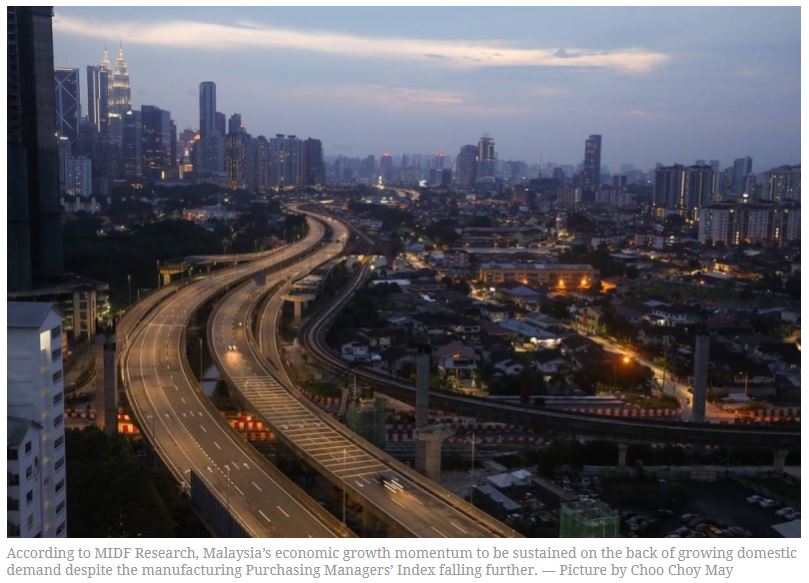MIDF: Malaysia’s economic growth to be sustained despite lower PMI in Oct
KUALA LUMPUR, Nov 2 ― MIDF Research expects Malaysia’s economic growth momentum to be sustained on the back of growing domestic demand despite the manufacturing Purchasing Managers’ Index (PMI) falling further to 48.7 last month from 49.1 in September 2022.
The research house said that although the PMI readings continued to signal slowing demand, external trade data remained robust defying slowdown concerns.
“While manufacturers in other countries expressed concerns on the outlook, Malaysia’s manufacturers continued to indicate optimistic sentiment.
“Still, we maintain a cautiously optimistic outlook for domestic production and trade activities, due mainly to uncertainties on the external front, such as the expected weakening of final demand from advanced economies amid concerns over recession risk, tighter Covid-19 restrictions in China, and the escalation of geo-political and trade tensions,” said MIDF Research.
The house added that there are also signs of weaker regional trade performance; South Korea reported on Tuesday that its exports declined 5.7 per cent year-on-year (y-o-y) in October 2022 following weak demand from China.
Similarly, Taiwan also reported a 5.3 per cent y-o-y fall in exports in September 2022, dragged down by weaker shipments to China.
Separately, S&P Global Market Intelligence said growth has softened across Asean manufacturing firms after ending the third quarter strongly.
Its latest S&P Global PMI survey data revealed that headline PMI signalled the slowest improvement in operating conditions across the region since the current series of expansion in October 2021, at 51.6 in October 2022, down from 53.5 in September 2022.
Commenting on the Asean Manufacturing PMI data, its economist Maryam Baluch said there is a slowdown in growth across Asean.
“Operating conditions improved at the weakest rate in the current 13-month sequence of expansion. Softer upturns were noted for both output and new orders. While expansion in production levels remained resilient, factory orders grew sluggishly during October.
“The slowdown also resonated in weak hiring activity and a softer expansion in purchasing levels, with firms noting rates of growth ticking down from the record speeds seen in the preceding month,” she said.
Nonetheless, manufacturers across the region maintained their positive outlook, with business confidence notably rising to the highest since April 2016, said Baluch.
The survey data also revealed that the majority of Asean constituents recorded improvement across their manufacturing sector during October, with the exception of Myanmar and Malaysia.
Malaysia and Myanmar reported contractions for the second and sixth consecutive months, respectively. Malaysian manufacturers saw a quicker downturn during October, said S&P Global. ― Bernama


 English
English




